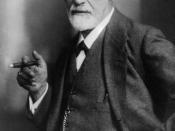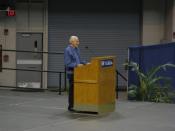Advances in medical technology have produced ethical dilemmas that people at any other time have confronted. The most imperative is, "how far do we go to save lives?" Today, compassion and common sense have been taken over by machines and technology. More than ever, there is an urge to change the rules.
Legalizing physician-assisted suicide would create a "slippery-slope" to euthanasia. Euthanasia is defined as the practice of terminating the life of a person or animal in a painless or minimally painful way in order to prevent suffering or other undesired conditions in life (Euthanasia). Loosening the assisted-suicide laws would eventually lead to the abuse of privileges. People without the support of their family or without enough money could be coerced into choosing to die.
Humans cannot place a price on lives of others. History has proven that the prices can be marked down. William L. Shirer interviewed a Nazi judge condemned to death at Nuremberg.
The judge, weeping, asked, "How could it have come to this?" Mr. Shirer replied, "Herr Judge, it came to this the first time you authorized the killing of an innocent life (Willke)." America has fought wars trying to protect the value of human life.
Many years ago, the physician's responsibility was to comfort his patients and to eliminate their pain, as death was inevitable. Today, medical advances have eliminated death due to many illnesses. Physical pain can usually be controlled. The pain that most people request death for is emotional whether they feel hopeless, unloved, anguished, isolated, or weary with life.
Many patients trust what their physicians tell them; however, the physicians are not always accurate in their prognosis. They cannot know for sure that a patient will die; thus, they should not have the power to authorize death. How will a...


